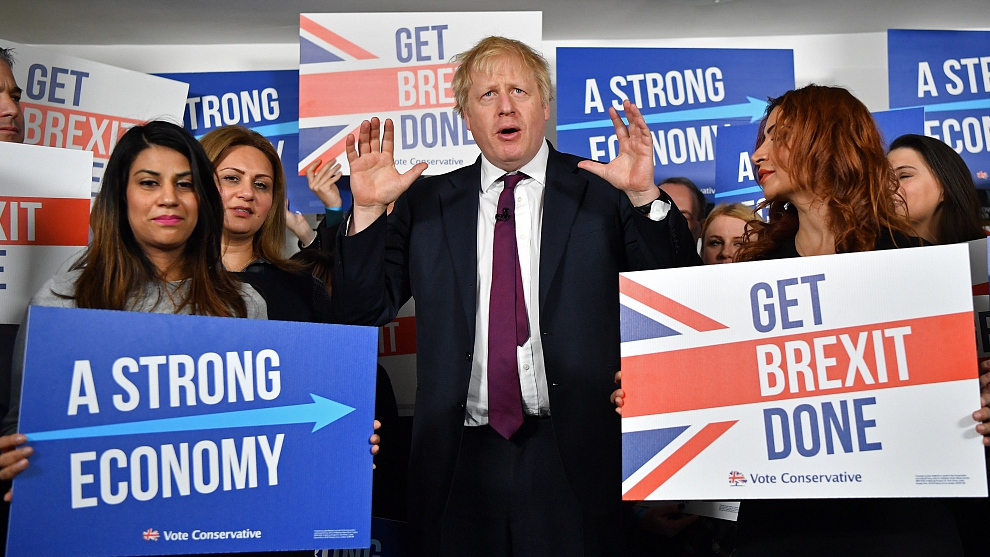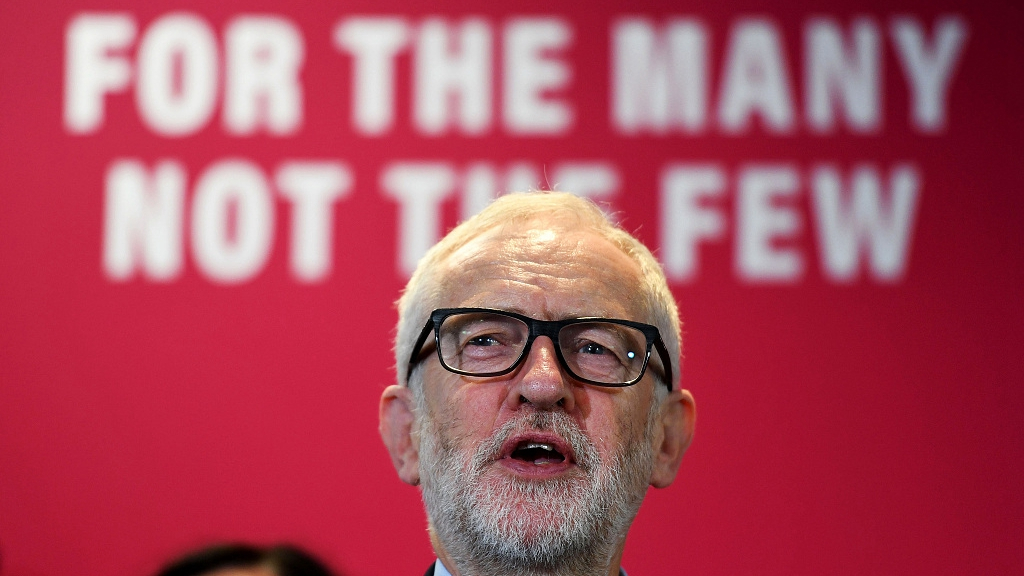National opinion polls give Boris Johnson's Conservatives a healthy lead over the Labour Party as election day nears in the UK, but given the uncertainties surrounding the December 12 poll, experts are cautious about predicting the outcome.
The result will have a profound impact on Britain's relations with the rest of the world – most notably via Brexit and trade, but also through potential changes to immigration, defense and security policy.
Here are four possible post-election scenarios.
Conservative majority
Polling suggests a Conservative majority government is the most likely outcome of the election, though the scale of any victory would dictate how it could govern.
Brexit: Every Conservative candidate has signed up to Johnson's Brexit deal. If the party wins a majority, the UK will (almost certainly) leave the European Union on January 31, 2020, and enter a transition period that lasts until the end of that year.
During that time, the UK will attempt to negotiate a trade deal with Brussels. Few analysts believe an agreement within 11 months is possible, however, so a no-deal exit could again loom at the end of next year.

British Prime Minister Boris Johnson speaks to activists in London, December 8, 2019. /VCG Photo
British Prime Minister Boris Johnson speaks to activists in London, December 8, 2019. /VCG Photo
The size of the majority will make a big difference: The trade deal is likely to be even more contentious with the UK parliament than the withdrawal agreement. Johnson is also targeting trade deals within Australia, New Zealand, Japan and the U.S. within three years.
Foreign and defense: Johnson has promised a wide-ranging review of defense policy and diplomacy, but insisted troop numbers won't be cut. He emphasized his commitment to NATO at last week's summit in London and has committed to meeting the two percent of GDP defense spending floor the alliance demands as well as 0.7 percent of GDP on foreign aid.
Immigration: The Conservatives want to bring in a points-based immigration system, applying the same rules to immigrants no matter which country they come from. The party argues the system would lead to more high-skilled immigrants but lower immigration overall.
Read more: Five things from the Conservative manifesto
Labour majority
The chances of an outright Labour majority are "as close to zero as one can safely say it to be," polling expert Professor John Curtice has said.
Brexit: Labour would negotiate its own Brexit deal with the EU within three months and put that agreement up against remaining in the EU in a second referendum within six months.
Any Labour deal would be much softer than the agreement negotiated by Johnson, including a UK-wide customs arrangement and "close alignment" with the single market. The result of a second referendum would be legally binding – parliament would not be able to vote it down.

Labour Party leader Jeremy Corbyn addresses an audience in Southampton, November 28, 2019. /VCG Photo
Labour Party leader Jeremy Corbyn addresses an audience in Southampton, November 28, 2019. /VCG Photo
Foreign and defense: The tone of UK foreign policy would change significantly under a Labour government. Leader Jeremy Corbyn has repeatedly opposed military intervention overseas, and a new law would prevent the UK from going to war without a vote in parliament.
The party would review the impact of Britain's colonial past – potentially offering apologies and compensation – suspend arms sales to Saudi Arabia and recognize Palestinian statehood. It would spend at least two percent of GDP on defense and a minimum of 0.7 percent of GDP on overseas aid.
Immigration: Labour would end minimum income requirements for immigrants and change the visa system to address shortages in specific areas. It did not include in its manifesto a commitment to freedom of movement post-Brexit, a position party members have backed.
Read more: Five things from the Labour manifesto
Labour-led coalition/minority
Labour has narrowed the polling gap on the Conservatives over the past two weeks, making a hung parliament possible. The party could form a minority government and strike an understanding with the Scottish Nationalists (SNP) and/or Liberal Democrats, depending on the numbers, though a formal coalition is unlikely.
Brexit: A second Brexit referendum would be inevitable: A new poll would be backed by Labour, the SNP and the Lib Dems. That would mean another extension to the deadline for the UK to leave the EU.
Other: SNP backing for a Labour-led government would be contingent on the promise of another Scottish independence referendum. Lib Dem backing would almost certainly include a demand for someone other than Corbyn to take over as prime minister.
Read more: Five things from the SNP manifesto
Read more: Five things from the Lib Dem manifesto
Conservative-led coalition/minority
The Conservatives could end up as the largest party in the House of Commons but without a majority. The party has no obvious allies in a hung parliament, having alienated the Democratic Unionists – the Northern Irish party that supported Theresa May's government – over Johnson's Brexit deal and refused a deal with the Brexit Party.
Brexit: Governing as a minority would put Johnson back to square one, and any loose alliance would require major concessions on Brexit. The Conservatives would struggle to pass Johnson's deal unless it was linked to a second referendum.
Other: A Conservative minority government would likely be short-lived. Johnson needs a sizable majority to deliver Brexit and a trade deal – and survive as prime minister.